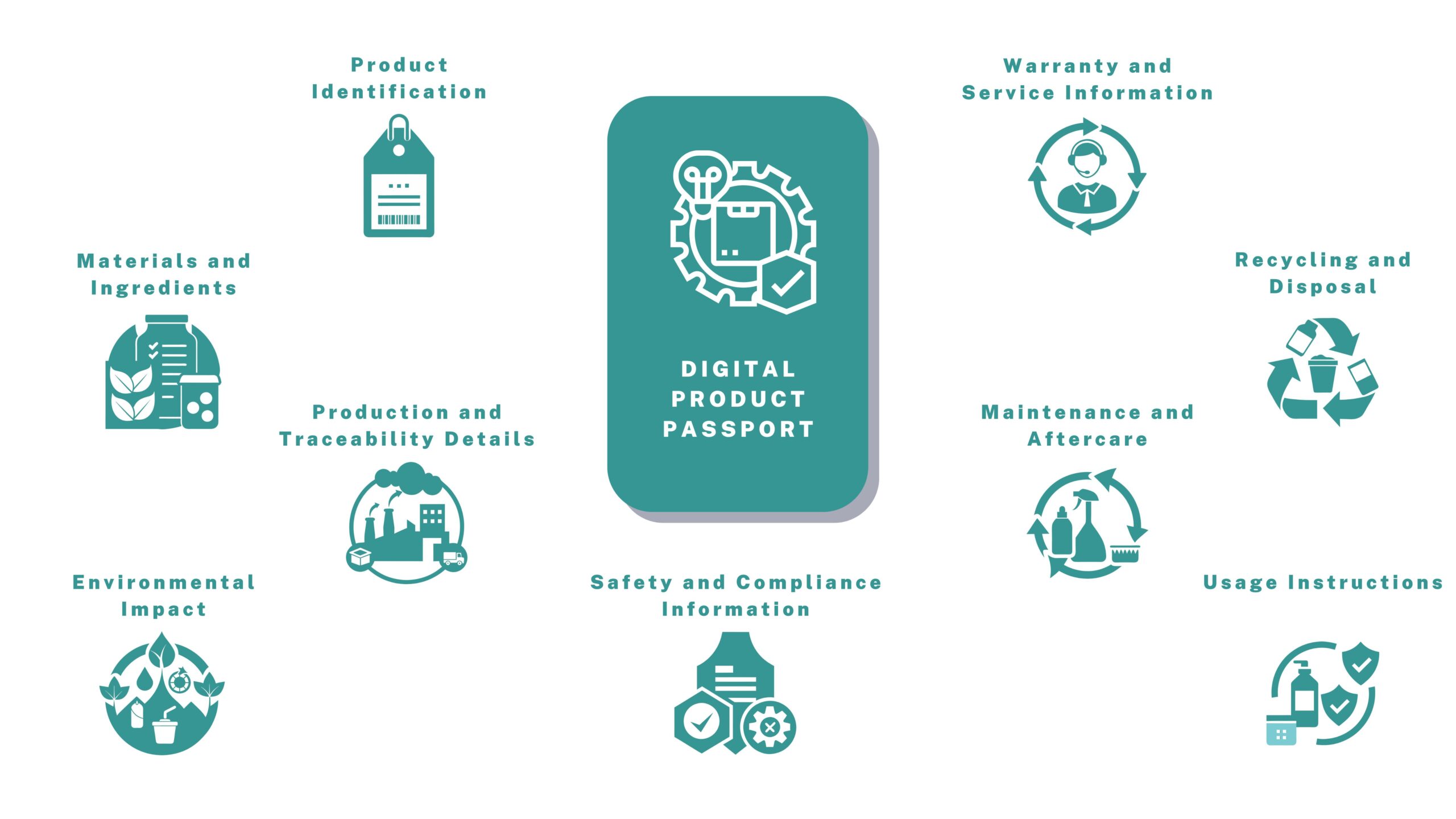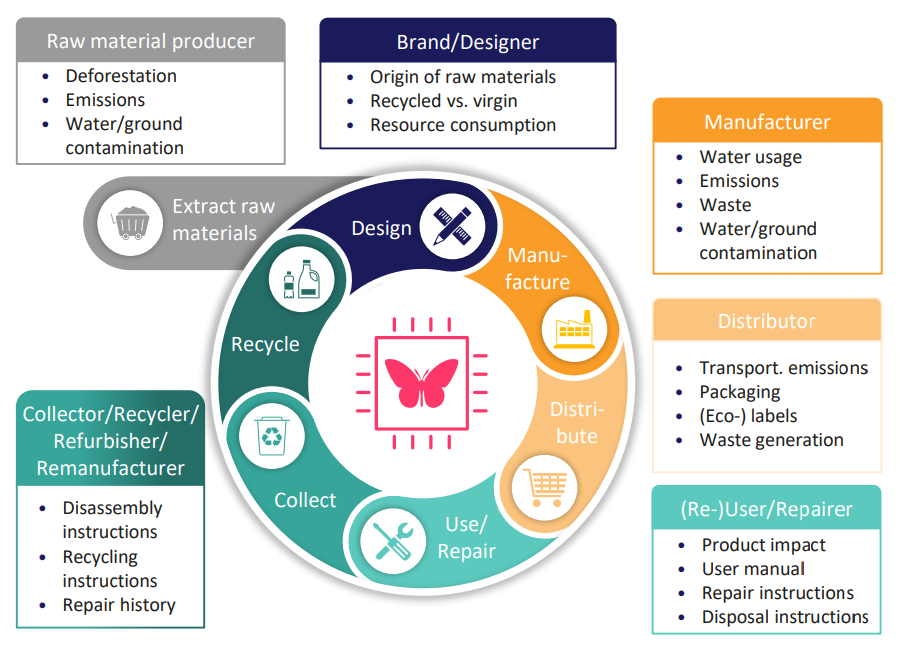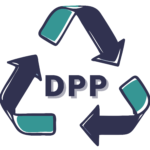In today’s global market, ensuring product safety and transparency is essential. The Digital Product Passport (DPP) is a groundbreaking tool that addresses these needs by capturing and sharing comprehensive product information throughout the entire supply chain.
What is a Digital Product Passport?
A Digital Product Passport is an electronic record that holds detailed information about a product’s lifecycle. This includes data on its origin, materials, manufacturing processes, compliance with regulations, and other essential details. By providing a single source of truth, DPPs help ensure that all stakeholders, including manufacturers, regulators, and consumers, have access to critical product information. This transparency is crucial in building trust and ensuring accountability throughout the product’s lifecycle.

Use Cases for Digital Product Passports
Digital Product Passport open up a world of possibilities, providing significant benefits in various areas. They enhance product authenticity, track environmental impact, facilitate recycling, and ensure ethical sourcing. Here are some of the key use cases:
- Checking for Counterfeit Products: DPPs provide verifiable details about a product’s origin and authenticity. This makes it easier to detect and avoid counterfeit goods, protecting consumers and maintaining brand integrity.
- Tracking Carbon Footprint: DPPs include information on the environmental impact of a product, such as its carbon footprint. This promotes sustainability by allowing consumers and businesses to make informed decisions that favor eco-friendly products.
- Facilitating Recycling Processes: DPPs can streamline recycling by providing detailed information about the materials used in a product. This helps recycling facilities sort and process materials more efficiently, reducing waste and promoting a circular economy.
- Ensuring Ethical Sourcing: By tracking the origin of raw materials, DPPs help ensure that products are made with ethically sourced materials. This transparency supports fair trade practices and helps businesses meet corporate social responsibility goals.
So, DPPs not only streamline these processes but also build consumer trust and promote sustainability. By leveraging the full potential of DPPs, businesses can ensure product integrity, meet regulatory requirements, and contribute to a transparent and responsible market.
The Importance of Digital Product Passports in Product Recalls
Product recalls are a vital aspect of consumer safety. When a product is found to be unsafe, it must be quickly recalled to prevent harm. DPPs play a crucial role in this process by providing detailed information that helps trace the product back through the supply chain. This traceability enables manufacturers and regulators to identify the source of the problem and take appropriate action swiftly.
For example, the Food Manufacturing recall alerts provide a comprehensive list of product recalls, illustrating the need for detailed product information in managing these recalls efficiently. Similarly, the UK Government’s product safety alerts and the European Commission’s Safety Gate platforms highlight the importance of having access to complete product data for effective recall management. Without such detailed information, isolating the root cause of issues and implementing corrective measures would be significantly more challenging.
Integrating Supply Chain Information
Complete supply chain transparency is essential for managing product recalls effectively. Every stage of the product’s journey, from raw materials to finished goods, must be documented. DPPs capture this information, ensuring any issues can be quickly identified and addressed. This comprehensive documentation helps pinpoint where things went wrong and take corrective measures to prevent future occurrences.
The Business.gov.nl site outlines the regulatory requirements for product safety notifications in the Netherlands, emphasizing the need for comprehensive supply chain documentation. By integrating supply chain information into DPPs, businesses can ensure they meet these regulatory requirements and maintain high product safety standards. This integration not only aids in compliance but also enhances operational efficiency by providing a clear view of the entire supply chain.

Source: www.wbcsd.org
Utilizing Product Information Management (PIM) Systems
Product Information Management (PIM) systems are vital for capturing and managing product data. They store all product-related information in a centralized repository, making it easily accessible to stakeholders. PIM systems enhance the efficiency and accuracy of data management, which is crucial for quick response times during product recalls. These systems ensure that all relevant data is up-to-date and can be retrieved promptly when needed.
PIM systems play a critical role in ensuring the quality and consistency of product information across various channels. They help businesses manage product data by providing tools for data enrichment, validation, and synchronization. This centralized approach to data management reduces errors and discrepancies that can arise from maintaining multiple data sources. Moreover, PIM systems facilitate collaboration among different departments, such as marketing, compliance, and logistics, by providing a unified view of product information.
Informatica’s recent webinar underscored the importance of effective data management in ensuring product safety. It highlighted how digital tools and PIM systems can streamline the process, enabling businesses to respond swiftly to safety issues. By leveraging PIM systems, businesses can not only manage their product data more effectively but also improve their overall supply chain transparency and operational efficiency. The integration of PIM systems with Digital Product Passport ensures that all relevant product information is consistently maintained and easily accessible, enhancing the ability to trace and recall products when necessary.
Link for webinar: https://www.linkedin.com/feed/update/urn:li:activity:7209815802680664064/
Ensuring Compliance and Building Consumer Trust
Compliance with safety regulations is essential for protecting consumers and maintaining brand reputation. Digital Product Passport help businesses adhere to stringent safety standards by providing detailed product information that demonstrates compliance. This proactive approach to compliance helps in avoiding legal issues and in maintaining a positive brand image.
The Protokol guide on Digital Product Passports explains how DPPs can enhance compliance efforts. By ensuring that all product data is accurate and up-to-date, businesses can avoid costly recalls and build consumer trust. Compliance not only protects consumers but also reinforces the company’s commitment to quality and safety, thereby strengthening brand loyalty. Digital Product Passports provide a transparent and verifiable record of a product’s compliance with various regulatory standards, which can be crucial during audits and inspections.
Blockchain Technology for Enhanced Trust
Several companies, such as GS1, offer services to maintain Digital Product Passport using blockchain technology. Blockchain ensures that data is immutable and transparent, building trust. This technology guarantees that any changes are easily detectable, further enhancing security and reliability.
Blockchain technology is particularly beneficial because it provides a tamper-proof record of all transactions and data changes. This immutability ensures that once information is recorded, it cannot be altered without leaving a trace. This feature is essential for maintaining the integrity of product information, especially in cases of recalls or disputes.
Moreover, blockchain can facilitate secure data sharing between different stakeholders. Manufacturers, suppliers, regulators, and consumers can access verified information without compromising data privacy. This level of security and transparency fosters a collaborative environment where trust is paramount.
Innovative Use Cases: Plastic Recycling
Another exciting use case for Digital Product Passport is in plastic recycling. Question about plastics and their production waste is one of the most global ecology problems of our world. A recent article by Digimarc discusses how DPPs can facilitate efficient plastic recycling processes by tracking the lifecycle of plastic products. This application underscores the versatility of DPPs in promoting sustainability and environmental responsibility.

By incorporating DPPs in the recycling process, recyclers can easily identify the types of plastics and their composition. This information is crucial for sorting and processing materials efficiently, reducing contamination, and improving the quality of recycled products. The detailed data provided by DPPs can also help manufacturers design products with better recyclability in mind, contributing to a more sustainable circular economy.
Summary
Digital Product Passports are revolutionizing the way we manage product safety and transparency. By capturing comprehensive information throughout the supply chain, DPPs ensure that businesses can quickly address any issues and maintain compliance with safety regulations. This proactive approach not only protects consumers but also strengthens brand trust. Embracing DPPs and leveraging PIM systems are essential steps towards a safer, more transparent market.
The combination of PIM systems and DPPs creates a powerful framework for managing product information and ensuring safety. While PIM systems provide the tools for efficient data management. DPPs in turn ensure that this information is accessible and actionable across the supply chain. Together, they enable businesses to maintain high standards of product quality, respond swiftly to safety issues, and build lasting consumer trust.
Join our newsletter
Be the first to know about Product Information Management news, helpful tips, and updates!
Join

